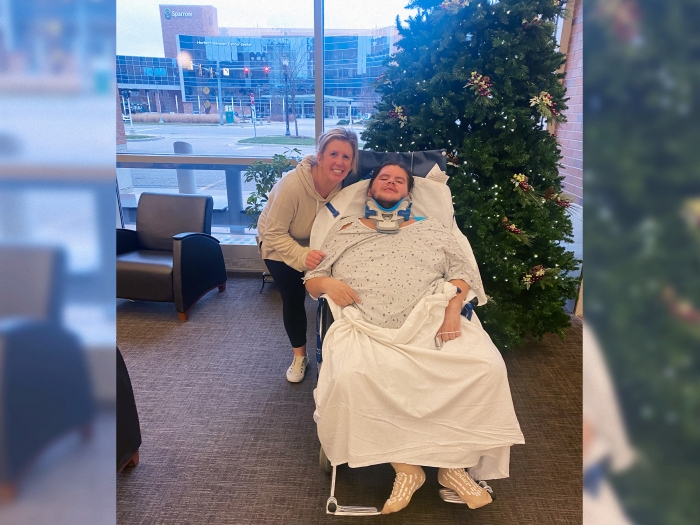Endowed professorships are among the highest honors the U-M Medical School awards to our faculty. These professorships, often made possible by the generosity of private individuals and foundations, honor the groundbreaking work faculty pursue — in the name of education, patient care and research.
Milagros D. Samaniego-Picota, M.D., was installed as the first Alan B. Leichtman, M.D., Collegiate Professor of Transplant Nephrology. Samaniego-Picota is an expert in basic and clinical transplant immunology and the clinical management of immunologically complex transplant recipients. She is also the medical director of the Kidney and Kidney/Pancreas Transplant Program and the Transplant Nephrology Fellowship Program at the U-M Health System. Leichtman, the immediate past-president of Gift of Life Michigan, is renowned for his innovative work in kidney and pancreas transplantation and presented Samaniego-Picato with the honor in a June 2 ceremony.
The first Trygve O. Gabrielsen Collegiate Professor of Radiology was established during a June 14 ceremony. Gabrielsen, a professor emeritus of radiology and former director of the Division of Neuroradiology, generously established the professorship in 2015, along with his wife, Ragnhild Gabrielsen, and contributions from numerous colleagues, friends and trainees. The inaugural Gabrielsen Professor, Mark A. Helvie, M.D. (Residencies 1983 and 1986, Fellowship 1987), is the director of the U-M Division of Breast Imaging, and has pioneered advances in nonsurgical breast cancer biopsies. His research has also led to advances in image processing for breast cancer detection, diagnosis and risk assessment.
On June 27, Patrick D. Schloss, Ph.D., became the Frederick Novy Collegiate Professor of Microbiome Research. The professorship is the second at U-M named after Novy, a bacteriologist who pushed the boundaries of science and medical education. Novy was named the first chair of the Department of Bacteriology at U-M in 1902 and later became dean of the Medical School. Schloss, the director of the Department of Microbiology and Immunology's Master of Science program, has contributed vital data to microbiome research through his software program, mothur.
The Louis Newburgh Research Professorship in Internal Medicine was established during a July 11 ceremony. Eve Kerr, M.D., will serve as the first Newburgh Professor as she continues her research on innovative methods in quality assessment and improvement for chronic conditions. Her most significant contributions focus on developing and implementing clinically meaningful measures to assess quality of care. Since 2008, Kerr has been the director of the Department of Veterans Affairs Center for Clinical Management Research. The professorship is given in honor of Newburgh's multiple accomplishments in medicine, among them a dedication to advancing research protocol.
The Amanda Sanford Hickey Collegiate Professorship in Internal Medicine was formally inaugurated during an Aug. 8 ceremony. Hickey, who received her degree from the Medical School in 1872, was one of its first female graduates. Hickey's devotion to her patients helped her become a renowned obstetrician and surgeon, and she blazed the trail for countless other women in medicine. Lona Mody, M.D. (Fellowship 1999), was named the first Hickey Professor. Mody, a professor of internal medicine and of geriatric medicine, is the associate chief of clinical and translation research in the Division of Geriatric and Palliative Medicine and associate director for translational research in the U-M Geriatrics Center.
In an Aug. 18 ceremony, Terrill Bravender Jr., M.D, became the first David S. Rosen, M.D., M.P.H., Collegiate Professor of Adolescent Medicine. The professorship was established in honor of Rosen, a beloved U-M faculty member, teacher and innovator in the field of adolescent health and eating disorders, who passed away in 2013. Bravender, a clinical professor of psychiatry and of pediatrics and communicable diseases, will carry on Rosen's legacy to help young people achieve mental and physical health. Bravender is also the founder and director of the Division of Adolescent Medicine and director of quality improvement for the Department of Pediatrics and Communicable Diseases.





